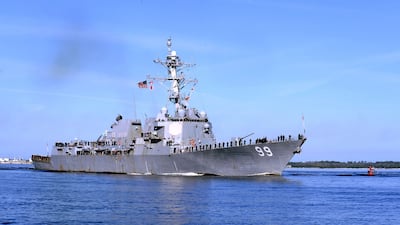The Strait of Hormuz is a notoriously tricky body of water for ships to navigate thanks to its narrow geography and, sometimes, because of the Iranian navy. Cargo ships passing through the strait, much of which falls in Oman’s territorial waters, are generally afforded safe passage as long as their voyage is peaceful in nature. Occasionally, however, foreign ships present an irresistible opportunity for the Iranian navy to demonstrate its presence and unceasing watchfulness.
As The National reported yesterday, the Iranian Revolutionary Guard navy appears to be up to its old tricks again. An Iranian naval vessel forced a cargo ship bound for Jebel Ali to change course towards Iran. At first, the captain of the Maersk Tigris, a ship chartered by Danish shipping giant Maersk and managed by the Hamburg-based Rickmers Group and flying a Marshall Islands flag, refused Iranian attempts to divert course. Finally, he relented after shots were fired across his vessel’s bridge. Iranian state media reported that the container ship was seized over a court order pertaining to a financial dispute between the ports authority and the ship’s owners. The timing of the whole incident raises a number of questions that the sketchy explanation cannot answer.
A beefed-up American naval presence in the Gulf; the continuing operation in Yemen; menacing of another Maersk vessel last week by Iranian naval units and subsequent dispatch of a US navy destroyer. All of these point to a dangerous escalation in the standoff between Iran and the rest of the region. Just a couple of weeks ago Iran sent a flotilla of ships to Yemen, presumably with the intention of resupplying Houthi rebels.
The United States has described both of these Iranian actions as “provocative” but it is not clear if any further action is likely. Suffice it to say that a repeat of 2007, when the Iranian navy seized the Royal Navy’s HMS Cornwell and its crew for two weeks claiming that the ship strayed into their territorial waters, wouldn’t bode well.
Iran must clear up the matter. If it forced the Maersk Tigris into Iranian waters over a civil dispute, then Tehran must disclose all of the details in an expeditious manner to set the record straight. The status quo in the Strait of Hormuz is delicately balanced, so any Iranian posturing carries serious weight. Iran has a lot of explaining to do.

